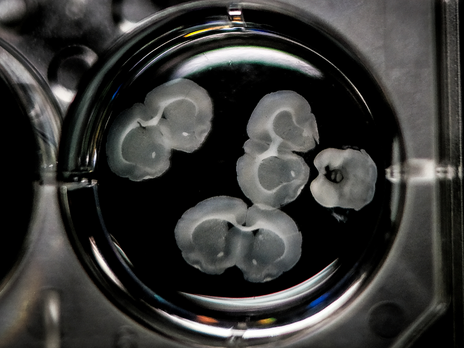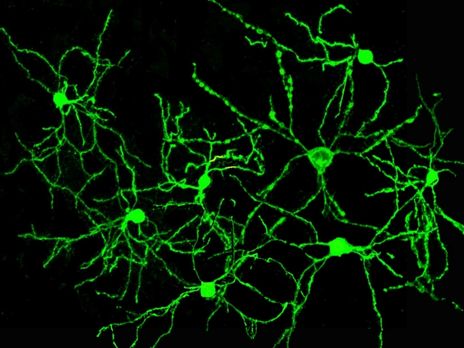
Neuronal circuits of reward and aversion
Since the moment we wake up, we are continuously flooded with sensory information of variable relevance. Therefore, our brains evolved to filter information…

I am a PhD student in Health Sciences at ICVS, with a research focus on neuroscience. I have a bachelor’s degree in Applied Biology (School of Sciences, University of Minho), having worked briefly in the field of oncology studying the role of WNT6 in a murine in vitro model of glioblastoma during my internship project.
I completed a master’s in Health Sciences (School of Medicine, University of Minho), having defended my dissertation – “Valence in the Nucleus Accumbens – Identifying Neural Populations in Appetitive and Aversive Responses” – under the supervision of Ana João Rodrigues and Carina Soares-Cunha. I studied how neuronal populations in the nucleus accumbens and amygdala subnuclei respond to positive and negative valence stimuli – a topic I am still exploring. For this, I use anatomically-detailed immunofluorescence and behavioural assessments (such as place preference tests) combined with aversive and appetitive stimuli and optogenetics. More recently, my work also involves implementing a variety of high-throughput techniques (proteomics, single cell RNA-sequencing, calcium imaging) to more comprehensively study this topic.
Our team’s work allowed for co-authorship in 2 published journal articles (Cell Reports, IF: 9.995; Translational Psychiatry, IF: 6.222) and in two posters presented at the international FENS Forum 2022.

I am a PhD student in Health Sciences at ICVS, with a research focus on neuroscience. I have a bachelor’s degree in Applied Biology (School of Sciences, University of Minho), having worked briefly in the field of oncology studying the role of WNT6 in a murine in vitro model of glioblastoma during my internship project.
I completed a master’s in Health Sciences (School of Medicine, University of Minho), having defended my dissertation – “Valence in the Nucleus Accumbens – Identifying Neural Populations in Appetitive and Aversive Responses” – under the supervision of Ana João Rodrigues and Carina Soares-Cunha. I studied how neuronal populations in the nucleus accumbens and amygdala subnuclei respond to positive and negative valence stimuli – a topic I am still exploring. For this, I use anatomically-detailed immunofluorescence and behavioural assessments (such as place preference tests) combined with aversive and appetitive stimuli and optogenetics. More recently, my work also involves implementing a variety of high-throughput techniques (proteomics, single cell RNA-sequencing, calcium imaging) to more comprehensively study this topic.
Our team’s work allowed for co-authorship in 2 published journal articles (Cell Reports, IF: 9.995; Translational Psychiatry, IF: 6.222) and in two posters presented at the international FENS Forum 2022.
Soares-Cunha, C., Domingues, A. V., Correia, R., Coimbra, B., Vieitas-Gaspar, N., de Vasconcelos, N. A. P., Pinto, L., Sousa, N., & Rodrigues, A. J. (2022). Distinct role of nucleus accumbens D2-MSN projections to ventral pallidum in different phases of motivated behavior. Cell Reports, 38(7), 110380. https://doi.org/10.1016/j.celrep.2022.110380
Domingues, A. V., Coimbra, B., Correia, R., Deseyve, C., Vieitas-Gaspar, N., Floresco, S. B., Sousa, N., Soares-Cunha, C., & Rodrigues, A. J. (2022). Prenatal dexamethasone exposure alters effort decision making and triggers nucleus accumbens and anterior cingulate cortex functional changes in male rats. Translational Psychiatry, 12(1). https://doi.org/10.1038/s41398-022-02043-4
The role of nucleus accumbens in the perception of natural rewards (No. 175/20_CCunha; Bial Foundation) – Research Fellow
Encoding Reward and Aversion in the mammalian brain: the overlooked role of endogenous opioids (HR20-01000; La Caixa Foundation) – Researcher
Challenging current models of valence encoding in the mammalian brain (ERC Consolidator 101003187; ERC) – Researcher

Since the moment we wake up, we are continuously flooded with sensory information of variable relevance. Therefore, our brains evolved to filter information…

Through evolution, animals gained the remarkable ability to respond with sub second precision to environmental stimuli and to learn to associate those with positive or negative outcomes…



Phone: +351 253 604 967
Fax: +351 253 604 809
Email: icvs.sec@med.uminho.pt
Life and Health Sciences
Research Institute (ICVS)
School of Medicine,
University of Minho,
Campus de Gualtar
4710-057 Braga
Portugal

Copyright ©2022 ICVS. All Rights Reserved



Copyright ©2022 ICVS. All Rights Reserved
Life and Health Sciences
Research Institute (ICVS)
School of Medicine,
University of Minho,
Campus de Gualtar
4710-057 Braga
Portugal



Copyright ©2022 ICVS. All Rights Reserved
Life and Health Sciences
Research Institute (ICVS)
School of Medicine,
University of Minho,
Campus de Gualtar
4710-057 Braga
Portugal

